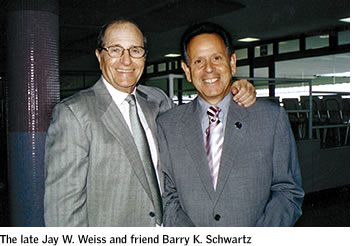The Jay Weiss Center for Social Medicine
and Health Equity, established in memory of philanthropist
Jay W. Weiss, received an inaugural gift of $1 million
from Sheryl and Barry K. Schwartz. The co-founder and
former CEO of Calvin Klein Inc., Schwartz was a close
friend of Jay Weiss.
 “Jay had a vision,” says Schwartz. “He
wanted to establish a place at the University of Miami
Miller
School of Medicine that would train doctors to help
the underserved and provide health care to people who
cannot
afford it. During the last two months of his life he
talked constantly about his vision for a center of
this kind and exactly what he hoped it would accomplish.” “Jay had a vision,” says Schwartz. “He
wanted to establish a place at the University of Miami
Miller
School of Medicine that would train doctors to help
the underserved and provide health care to people who
cannot
afford it. During the last two months of his life he
talked constantly about his vision for a center of
this kind and exactly what he hoped it would accomplish.”
Weiss was a lifelong contributor to
local, national, and international charitable causes,
including the Miller
School of Medicine and the University of Miami Sylvester
Comprehensive Cancer Center. He died in 2004 at the
age of 76.
The founders of
the Jay Weiss Center believe that there is a critical
need for the development
and support of
physicians and policy advocates who will be effective
in increasing access to health care and improving the
quality of life of the poorest members of society.
Paul Farmer, M.D., Ph.D., the Harvard University medical
anthropologist
and physician who has dedicated his life to bringing
health care to some of the world’s poorest populations,
serves as a special advisor to the center.
The first project
supported by the center was the establishment of the
Jay Weiss Residency
Program in Internal Medicine
and Global Health Equity. This residency program offers
a comprehensive training experience for doctors who
wish to dedicate their careers to the service of the
poor
and the advancement of the goal of health care as a
human right. The program’s first two residents are currently
taking part in a four-year training program that adds
rotations at field sites in Miami and abroad serving
the poor, specific research and curriculum in health
equity, and a master’s in public health to the
traditional internal medicine training program.
The residents’ first international
rotation took place last July, when they traveled to
Haiti for two
weeks to shadow physicians at Zanmi8 Lasante, the medical
center established by Boston-based Partners in Health
in Cange, and at UM’s family medicine residency
training program in Cap Haitien. Following their Haitian
study trip, the residents also attended the International
AIDS conference that was held in Toronto in August.
The center’s
goal to train leaders and practitioners in social medicine
and health equity will also be furthered
by a new Grand Rounds series. Open to the Miller School
of Medicine academic community, this lecture series
will be held throughout the year.
“Jay touched so many people during his
lifetime that it is my hope that others will learn from
his example
and
also support the center that bears his name,” Schwartz
says. |